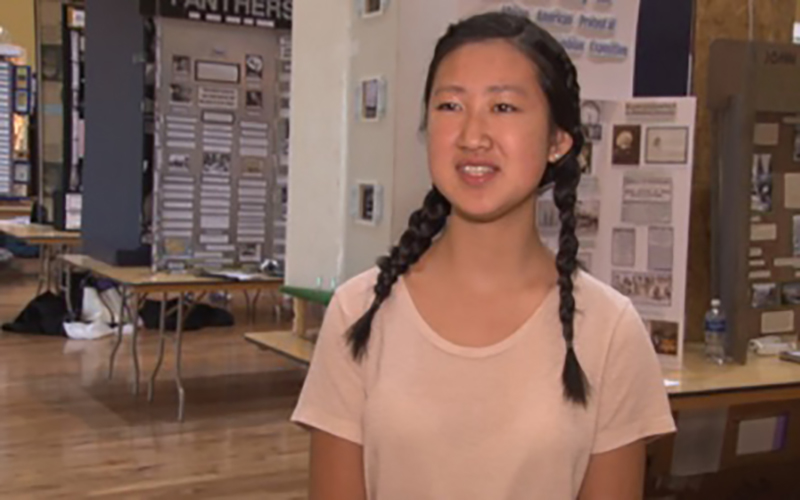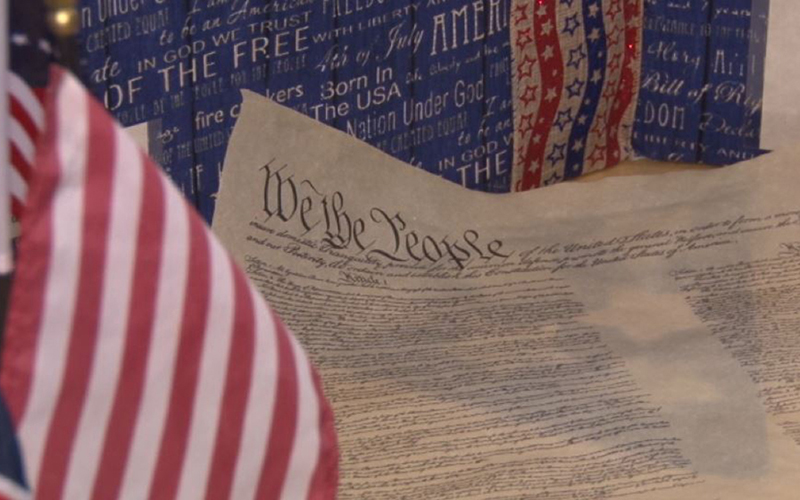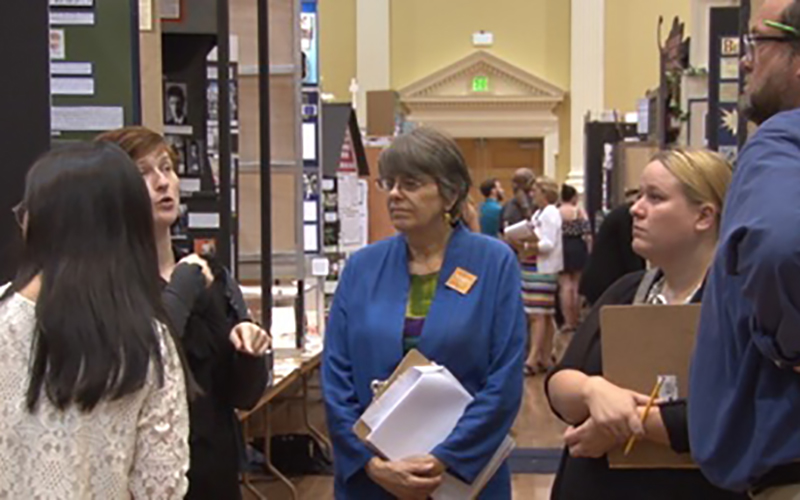
Flagstaff seventh-grader Joy Kim talks about the documentary that she and fellow Northlands Preparatory Academy student Ella Downard prepared on Malala Yousafzai for National History Day. (Photo by Alex Valdez/Cronkite News)

A display at the National History Day competition. Students were give the broad theme of “taking a stand in history” and had to do a report , a performance or a documentary on a historical figure. (Photo by Alex Valdez/Cronkite News)

Students describe their presentations to the judges at the National History Day competition at the University of Maryland, where more than 3,000 middle and high school students competed. (Photo by Alex Valdez/Cronkite News)
COLLEGE PARK, Md. – It took months of research, but Flagstaff seventh-graders Joy Kim and Ella Downard were finally able to produce a 10-minute documentary on Malala Yousafzai, the Pakistani girl whose courage and determination to get an education won her the Nobel Peace Prize at age 17.
“Our bibliography had over 4,000 words and about 80 citations,” Joy said as the presented their project. “It is just a really great accomplishment to just be here right now because we did not think we would get this far.”
“Here” was the National History Day competition last week at the University of Maryland, where the Northland Preparatory Academy students joined more than 3,000 other middle and high school students competing in a range of categories.
While students who enjoy spelling have the Scripps National Spelling Bee and those who like geography can compete in the National Geographic Bee, kids who like history convene on the nation’s capital every summer for the National History Day competition.
Like those competitions, the history competition starts at the individual school level and works up through region and state competitions before heading to the national stage.
Organizers claim that hundreds of thousands of students compete each year in the competition, which includes foreign countries as well as U.S. states, conducting historical research on a topic of their choosing. Stacey Trepenier wishes the number was higher.
“I just wish every school did National History Day,” said Trepenier, the lead teacher-ambassador for National History Day in central Arizona. “It is a growing program. It is bigger this year than it ever has been.”
Trepenier, a sixth-grade teacher at New Vistas Center for Education in Chandler, also works with East Valley students whose schools do not have a National History Day program.
“It really immerses the kids and they encourage students to study all areas. It is very cross-cultural, very cross-curriculum and very hands on,” she said.
“The students really get engaged. It is a full learning process,” Trepenier said.
The purpose of the competition is not just to promote history, but also to give students a chance to develop strong academic skills, said Gary Pettit, the director of communications for the competition.
“Our focus and emphasis is promoting and increasing the teaching and learning of history in primary and secondary education,” he said. “It is a project-based contest. So, kind of like science fair but for history.”
-Cronkite News video by Alex Valdez
Pettit, who estimated that there were about 100 Arizona students at the national competition last week, said the goal of National History Day is to challenge students to take an interest in history.
Each year, students are given a theme for their projects. This year’s was “taking a stand in history,” and students were expected to find a historical person or group that took a stand for their beliefs, whether that was positive or negative.
Participants created projects in one of the three different media, from writing an report, to putting on a historical performance or, in the case of Joy and Ella, producing a documentary.
Joy says their documentary starts as a background story about Yousafzai’s life. The Pakistani teen spoke frankly about life under the Taliban, which attempted to assassinate her as she was riding the bus home from school in 2012.
“We also talked about a lot of her speeches and awards and quotes because that is who she is,” Joy said of Yousafzai, who
continues to speak out for the right of girls to get an education.
The final documentary is based on four primary and secondary source and is filled with images, videos, and information that both Joy and Ella had obtained during their research process.
When the winners in the junior group documentary category were announced Thursday, the top prize in the category went to three middle school students from Sammamish, Washington. But Joy took it in stride.
“I was not really sad in any way, because we worked really hard on this,” she said.
Joy and Ella are already planning for next year’s project, when Joy said they “are hoping to get together a few of our friends to put together a performance.”
“I really want to continue doing national history day every year if I can,” Joy said.